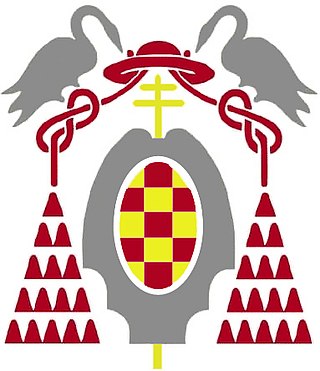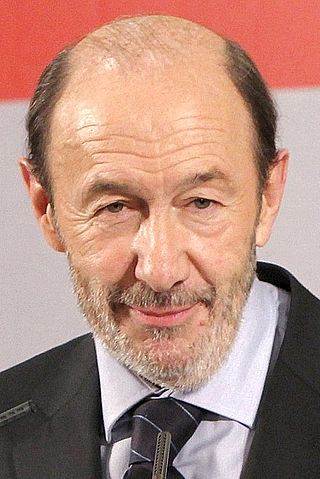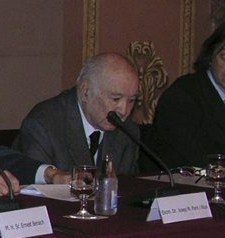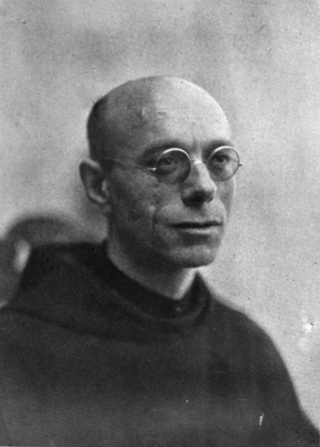Related Research Articles

Alcalá de Henares is a Spanish city in the Community of Madrid. Straddling the Henares River, it is located 31 kilometres to the northeast of the center of Madrid. As of 2018, it has a population of 193,751, making it the region's third-most populated municipality.

The Complutense University of Madrid is a public research university located in Madrid. Founded in Alcalá in 1293, it is one of the oldest operating universities in the world. It is located on a sprawling campus that occupies the entirety of the Ciudad Universitaria district of Madrid, with annexes in the district of Somosaguas in the neighboring city of Pozuelo de Alarcón. It is named after the ancient Roman settlement of Complutum, now an archeological site in Alcalá de Henares, just east of Madrid.

Francisco Jiménez de Cisneros, OFM was a Spanish cardinal, religious figure, and statesman. Starting from humble beginnings he rose to the heights of power, becoming a religious reformer, twice regent of Spain, Cardinal, Grand Inquisitor, promoter of the Crusades in North Africa, and founder of the Alcalá University. Among his intellectual accomplishments, he is best known for funding the Complutensian Polyglot Bible, the first printed polyglot version of the entire Bible. He also edited and published the first printed editions of the missal and the breviary of the Mozarabic Rite, and established a chapel with a college of thirteen priests to celebrate the Mozarabic Liturgy of the Hours and Eucharist each day in the Toledo Cathedral.

Joanna of Castile, known as la Beltraneja, was a claimant to the throne of Castile, and Queen of Portugal as the wife of King Afonso V, her uncle.

Henry IV of Castile, nicknamed the Impotent, was King of Castile and León and the last of the weak late-medieval kings of Castile and León. During Henry's reign, the nobles became more powerful and the nation became less centralised.

The University of Alcalá is a public university located in Alcalá de Henares, a city 35 km northeast of Madrid in Spain and also the third-largest city of the region. It was founded in 1293 as a Studium Generale for the public, and was refounded in 1977. The University of Alcalá is especially renowned in the Spanish-speaking world for its annual presentation of the highly prestigious Cervantes Prize. The university currently enrolls 28,336 students, 17,252 of whom are studying for undergraduate degrees, who are taught by a teaching staff of 2,608 professors, lecturers and researchers belonging to 24 departments. The administrative tasks are carried out by the university's Administration and Services, comprising approximately 800 people.

Alfredo Pérez Rubalcaba was a Spanish statesman, politician and chemist who served as Deputy Prime Minister of Spain from 2010 to 2011, and previously as Minister of Education from 1992 to 1993, as Minister of the Presidency from 1993 to 1996, as Minister of the Interior from 2006 to 2011 and as acting Minister of Defence between May and June 2008.

Alfonso de Santa María de Cartagena was a Jewish convert to Christianity, a Roman Catholic bishop, diplomat, historian and writer of pre-Renaissance Spain.

Martí de Riquer i Morera, 8th Count of Casa Dávalos was a Spanish literary historian and Romance philologist, a recognised international authority in the field. His writing career lasted from 1934 to 2004. He was also a nobleman and Grandee of Spain.

Ferdinand II was King of Aragon from 1479 until his death in 1516. As the husband of Queen Isabella I of Castile, he was also King of Castile from 1475 to 1504. He reigned jointly with Isabella over a dynastically unified Spain; together they are known as the Catholic Monarchs. Ferdinand is considered the de facto first king of Spain, and was described as such during his reign, even though, legally, Castile and Aragon remained two separate kingdoms until they were formally united by the Nueva Planta decrees issued between 1707 and 1716.

Joseph Pérez was a French historian specializing in Spanish history. Pérez specialized in the births of the modern Spanish state and the Latin American nations. Among his books, he examined the independence movements of Hispanic America; Ferdinand and Isabella, the Catholic Monarchs; Holy Roman Emperor Charles V, and Philip II of Spain.

Isabella I, also called Isabella the Catholic, was Queen of Castile from 1474 until her death in 1504. She was also Queen of Aragon from 1479 until her death as the wife of King Ferdinand II. Reigning together over a dynastically unified Spain, Isabella and Ferdinand are known as the Catholic Monarchs.

Margarita Salas Falgueras, 1st Marchioness of Canero was a Spanish scientist, medical researcher, and author in the fields of biochemistry and molecular genetics.

Enrique García Hernán is a Spanish historian of the culture of early modern Europe. His research examines the interaction of religious sentiment, political thought and international relations in the sixteenth, seventeenth and eighteenth centuries. It attempts to bridge the gap between the study of forms of cultural and intellectual expression and the realities of political, diplomatic and military organization. He is a Corresponding Fellow of the Royal Academy of History, member of the Board of Directors (Vocal) of the Spanish Commission for Military History, and Fellow (Académico) of the Ambrosiana Academy of Milan. His current academic affiliation is as a research professor in the Institute of History, within the Center for Humanities and Social Sciences at the Spanish National Research Council. The Spanish National Research Council is the largest public institution dedicated to research in Spain and the third largest in Europe.

Justo Pérez Santiago later known as Fray Justo Pérez de Urbel y Santiago O.S.B. was a Spanish Roman Catholic clergyman and medievalist, first abbot of the Monastery of the Holy Cross of the Valle de los Caídos, member of the Consejo Nacional del Movimiento, later a Procurador en Cortes and distinguished scholar of medieval Castile.
The Libros del saber de astronomía, literally "book[s] of the wisdom of astronomy [astrology]", is a series of books of the medieval period, composed during the reign of Alfonso X of Castile. They describe the celestial bodies and the astronomical instruments existing at the time. The collection is a group of treatises on astronomical instruments, like the celestial sphere, the spherical and plane astrolabe, saphea, and universal plate for all latitudes, for uranography or star cartography that can be used for casting horoscopes. The purpose of the rest of the instruments, the quadrant of the type called vetus, sundial, clepsydras, is to determine the time, which was also needed to cast the horoscope. The king looked for separate works for the construction and use of each device.
Jaime Alvar Ezquerra is a Spanish historian, author and professor at the Charles III University of Madrid, specializing in ancient history.

José Elguero Bertolini is a Spanish chemist best known for his contributions to heterocyclic chemistry. He is Honorary Research Professor at the Medicinal Chemistry Institute of the Spanish Council for Scientific Research (CSIC).
Manuel Alvar was a Spanish linguist, historian, and university professor who specialized in the study of dialectology and philology of the Spanish language. Throughout his career, Alvar oversaw and influenced the creation of many Spanish linguistic atlases; maps which recorded speech variations in a given geographical area. He served as Director of the Real Academia Española for four years and was a member of language academies throughout Europe and Latin America.
Francisca Rubio Gámez, better known by the pseudonym Fanny Rubio, is a Spanish professor, researcher, and writer, an expert in contemporary Spanish poetry.
References
- ↑ "CSIC: INSTITUTO DE HISTORIA. Inicio". Archived from the original on 2010-01-20. Retrieved 2010-02-13.
- ↑ Kamen, Henry (January 1997). Philip of Spain. ISBN 0300078005.
- ↑ "Alfredo Alvar Ezquerra". Archived from the original on 2016-03-03. Retrieved 2010-02-13.